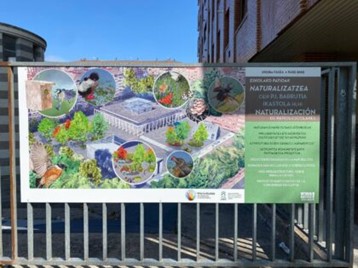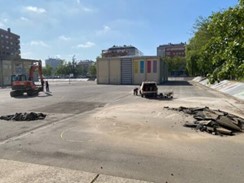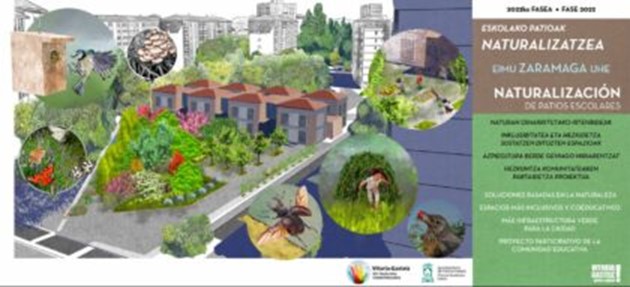Six new schoolyards in Vitoria-Gasteiz are being naturalised this summer
For several years now, the educational community has been transforming schoolyards into more inclusive, co-educational, sustainable, and greener spaces. The overall goal: To turn them into social meeting points and an expanded space for learning and education.
Based on naturalisation interventions, the schoolyards are now spaces with a higher biodiversity and improved climate resilience. They also serve as a resource for environmental education. And they active the school community in the fight against climate change. The naturalisation of an everyday space such as playgrounds is, on the one hand, an educational challenge. On the other hand, it is an opportunity to generate deeper changes at the social and community level. The schoolyard greening helps to enable a better understanding of the diverse students’ needs. What is more, it incorporates a coeducational perspective, the promotion of more egalitarian relationships and a more inclusive use of outdoor school spaces.
“The naturalisation of schoolyards is the future. It brings nature closer to the school community. It also promotes values such as equality, diversity, sustainability. Those are basic pillars of the society we want to build and are building. A society of which the students who are in the classrooms today will be part of”, says Sonia Díaz de Corcuera, Councilor for Education and Culture.
A programme that goes beyond “green” renovations
The naturalisation of schoolyards focuses on three lines of work:
- Transforming the outdoor schoolyards of municipality-owned pre-schools and educational centres in Vitoria-Gasteiz through nature-based solutions. They will be in incorporated into the city’s green infrastructure system. This will boost the measures of climate change adaptation. Those are based on the active participation of the educational community. And they incorporate the values of co-education, inclusion, and sustainability as principles for intervention.
- Support is provided at two stages: Encouraging the participation and involvement of the educational community in the design of the greening intervention. At a later stage, through educational support aimed at incorporating the programme’s objectives into the educational projects.
– The third and final stage focuses on the training of the educational community and of the citizenship as a whole.
The naturalization of Vitoria-Gasteiz’ schoolyards is also part of BIOTraCes. This is an EU-funded research project involving nine research institutions which aim at boosting biodiversity in Europe and beyond. Locally, the Basque Center for Climate Change (BC3) will examine the role green schoolyards can play in fostering nature-positive relationship of school kids and the broader educational community.
Summer Course “Educating City: naturalisation of schoolyards”.
In the context of the initiative for the naturalisation of schoolyards, the City Council of Vitoria-Gasteiz and the University of the Basque Country (UPV/EHAU) organised a Summer Course. It focused on the physical, pedagogical, and environmental foundations of the naturalisation of educational spaces. In addition, it presented practical experiences and tools for green transformation of schoolyards.The Summer Course also aims at building support and participation of the local educational communities.
More information: Summer course “the educational city”


